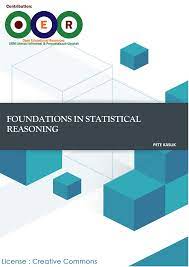
|
FreeComputerBooks.com
Links to Free Computer, Mathematics, Technical Books all over the World
|
|
- Title: Foundations in Statistical Reasoning
- Author(s) Pete Kaslik
- Publisher: Lulu.com (2015); eBook (Creative Commons Edition, 2021)
- License(s): CC BY-NC-SA 4.0
- Paperback: N/A
- eBook: PDF
- Language: English
- ISBN-10: N/A
- ISBN-13: N/A
- Share This:

|
Foundations in Statistical Reasoning is designed for students taking an introductory statistics class. The emphasis throughout the entire book is on how to make decisions with only partial evidence.
Consequently, decisions are actually based on the results of one sample with the knowledge that a different sample may have resulted in a different conclusion. Thinking statistically is much different than thinking algebraically.
This text focuses on the thought process. The concepts of hypothesis testing, errors, and p-values are introduced in the second chapter at an elementary level and then used throughout the remainder of the book. Inferential theory begins with a hypothesis, incorporates probability rules, and ultimately leads to the development of the hypothesis test formulas.
Homework problems at the end of the chapters integrate concepts from throughout the book so that students can learn how the concepts work together to help answer questions with partial information.
About the Authors- N/A
- Statistics and Mathematical Statistics
- Bayesian Thinking
- Probability and Stochastic Process
- Data Analysis and Data Mining Books

- Foundations in Statistical Reasoning (Pete Kaslik)
- The Mirror Site (1) - PDF
- Fundamentals of Statistical Reasoning in Education
-
 Statistics Done Wrong: The Woefully Complete Guide (Reinhart)
Statistics Done Wrong: The Woefully Complete Guide (Reinhart)
Scientific progress depends on good research, and good research needs good statistics. But statistical analysis is tricky to get right, even for the best and brightest of us. You'd be surprised how many scientists are doing it wrong.
-
 Statistical Thinking for the 21st Century (Russell A. Poldrack)
Statistical Thinking for the 21st Century (Russell A. Poldrack)
Statistical thinking is increasingly essential to making informed decisions based on uncertain data. This book provides the tools to describe complex patterns that emerge from data and to make accurate predictions and decisions based on data.
-
 Introduction to Statistical Thought (Michael Lavine)
Introduction to Statistical Thought (Michael Lavine)
The book is intended as an upper level undergraduate or introductory graduate textbook in statistical thinking with a likelihood emphasis for students with a good knowledge of calculus and the ability to think abstractly.
-
 Introduction to Statistical Thinking (Benjamin Yakir)
Introduction to Statistical Thinking (Benjamin Yakir)
This book offers a detailed, illustrated breakdown of the fundamentals of statistics. Develop and use formal logical thinking abilities to understand the message behind numbers and charts in science, politics, and economy.
-
 Lies, Damned Lies: How to Tell the Truth with Statistics
Lies, Damned Lies: How to Tell the Truth with Statistics
The goal is to help you learn How to Tell the Truth with Statistics and, therefore, how to tell when others are telling the truth ... or are faking their "news". Covers Data Analysis, Binomial and normal models, Sample statistics, confidence intervals, hypothesis tests, etc.
-
 Mostly Harmless Statistics (Rachel L. Webb)
Mostly Harmless Statistics (Rachel L. Webb)
This text is for an introductory level probability and statistics course with an intermediate algebra prerequisite. The focus of the text follows the American Statistical Association's Guidelines for Assessment and Instruction in Statistics Education (GAISE).
-
 Revealing Statistical Principles (Jim K. Lindsey)
Revealing Statistical Principles (Jim K. Lindsey)
Written by a renowned statistician, this book presents the basic ideas behind the statistical methods commonly used in studies of human subjects. Accessible to a wide audience with little background in statistics.
-
 Introduction to Modern Statistics (Mine Çetinkaya-Rundel, et al.)
Introduction to Modern Statistics (Mine Çetinkaya-Rundel, et al.)
This book puts a heavy emphasis on exploratory data analysis and provides a thorough discussion of simulation-based inference using randomization and bootstrapping, followed by a presentation of the related Central Limit Theorem based approaches.
-
 Answering Questions with Data : Introductory Statistics
Answering Questions with Data : Introductory Statistics
This is a free textbook teaching introductory statistics for undergraduates. Students will learn to select an appropriate data analysis technique, carry out the analysis, and draw appropriate conclusions.





